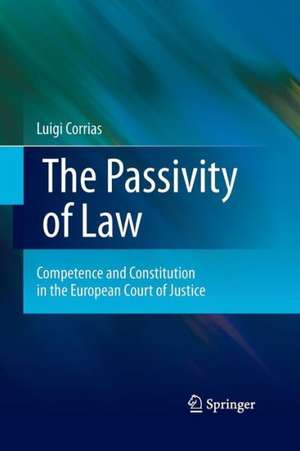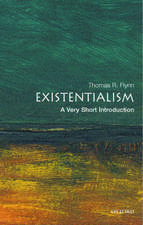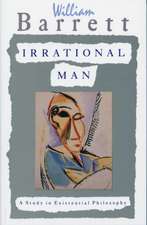The Passivity of Law: Competence and Constitution in the European Court of Justice
Autor Luigi Corriasen Limba Engleză Paperback – 16 oct 2014
| Toate formatele și edițiile | Preț | Express |
|---|---|---|
| Paperback (1) | 635.15 lei 6-8 săpt. | |
| SPRINGER NETHERLANDS – 16 oct 2014 | 635.15 lei 6-8 săpt. | |
| Hardback (1) | 641.71 lei 6-8 săpt. | |
| SPRINGER NETHERLANDS – 15 apr 2011 | 641.71 lei 6-8 săpt. |
Preț: 635.15 lei
Preț vechi: 747.23 lei
-15% Nou
Puncte Express: 953
Preț estimativ în valută:
121.53€ • 127.23$ • 100.56£
121.53€ • 127.23$ • 100.56£
Carte tipărită la comandă
Livrare economică 05-19 aprilie
Preluare comenzi: 021 569.72.76
Specificații
ISBN-13: 9789400792081
ISBN-10: 9400792085
Pagini: 188
Ilustrații: XV, 171 p.
Dimensiuni: 155 x 235 x 10 mm
Greutate: 0.27 kg
Ediția:2011
Editura: SPRINGER NETHERLANDS
Colecția Springer
Locul publicării:Dordrecht, Netherlands
ISBN-10: 9400792085
Pagini: 188
Ilustrații: XV, 171 p.
Dimensiuni: 155 x 235 x 10 mm
Greutate: 0.27 kg
Ediția:2011
Editura: SPRINGER NETHERLANDS
Colecția Springer
Locul publicării:Dordrecht, Netherlands
Public țintă
ResearchCuprins
Acknowledgements.- Introduction.- Chapter I Competences and Authority in the European Legal Order.- Chapter II Paradigms of Constitution-Making, or Two Tales of One Dualism.- Chapter III Rethinking Constituent Power: A Chiastic Alternative.- Chapter IV Embodying the Rule: The Passivity of Constitution.- Chapter V Constituting Competence: The Court of Justice and the European Legal Order.- Conclusive Summary.- Bibliography.
Textul de pe ultima copertă
Europe’s constitutional journey has not been a smooth one, and a better division and definition of competence in the European Union is a key issue that needs to be addressed. How can the division of competence be made more transparent? Should there be a reorganization of competence? How can it be ensured that the redefined division of competence will not lead to a creeping expansion of the competence of the Union or to encroachment upon the exclusive areas of competence of the Member States and regions? And how can it be ensured that the European dynamic does not come to a halt? Indeed, has the creeping expansion of the competence of the Union already come to a halt? These are the legal and political questions this book takes as its starting point for an in-depth exploration of the philosophical foundations of European constitutionalism.
The Passivity of Law: Competence and Constitution in the European Court of Justice opens with a legal account of the competence creep, including the role that the European Court of Justice plays in it and a sketch of the present division of competences and the main principles regulating it. It then discusses the relationship between constituent power and constituted or constitutional power from the viewpoint of the history of constitutional theory before offering an alternative interpretation of their relationship, the “chiastic theory,” which is based on the philosophical investigations of M. Merleau-Ponty. It details how this chiastic approach can be used to make sense of the Court’s role in the competence creep in general and the doctrine of implied powers in particular, and it utilizes several case studies concerning competences to sustain this claim. Aimed at researchers and practitioners in Philosophy, Phenomenology, Political Science, the Social Sciences and numerous fields of law, this monograph is a seminal work in the evolving theory andpractice of EU (constitutional) law.
The Passivity of Law: Competence and Constitution in the European Court of Justice opens with a legal account of the competence creep, including the role that the European Court of Justice plays in it and a sketch of the present division of competences and the main principles regulating it. It then discusses the relationship between constituent power and constituted or constitutional power from the viewpoint of the history of constitutional theory before offering an alternative interpretation of their relationship, the “chiastic theory,” which is based on the philosophical investigations of M. Merleau-Ponty. It details how this chiastic approach can be used to make sense of the Court’s role in the competence creep in general and the doctrine of implied powers in particular, and it utilizes several case studies concerning competences to sustain this claim. Aimed at researchers and practitioners in Philosophy, Phenomenology, Political Science, the Social Sciences and numerous fields of law, this monograph is a seminal work in the evolving theory andpractice of EU (constitutional) law.
Caracteristici
An in-depth analysis of the 'competence creep' in EU law First book to use the work of Merleau-Ponty to rethink European integration Offers original interpretations of constitutional theory, rule-following and authority Includes supplementary material: sn.pub/extras
















